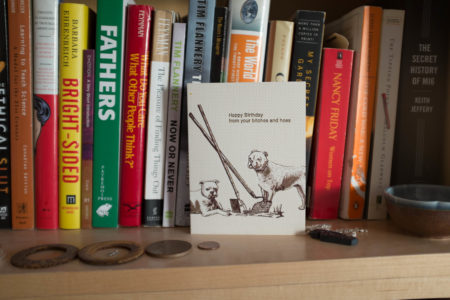Author: Milan
Dangerous cyborg spotted at local home
Canine birthday card
Dawn after a night’s work
Unicode characters are spoiling my LaTeX bibliography and I cannot find them
I was being driven a little up the wall by biblatex rendering errors which referred to Unicode characters within my .bib database.
First I learned that the degree-like symbol you get from typing option + 0 in Mac OS is actually the “Masculine Ordinal Indicator” and you should use Option + Shift + 8 for a degree symbol.
That’s not much help though, since degree signs in your .bib file will still cause problems for creating a bibliography. Instead you need to put in titles like “Global warming of 1.5 \textdegree\ C” which almost renders properly, with the only problem the inclusion of a space between ° and C.
Much more annoying was one ‘ZERO WIDTH NON-JOINER’ (U+200C) which snuck into my .bib file. The error logs don’t say what line it is on, and the character is invisible in TextMate. After trying a bunch of ineffective suggestions on various web forums, I found one that referenced this Unicode converter. Throw in your bibliography and it will tell you the contents in Unicode terms character by character and let you find anything which is yielding errors.
Re-kindling multilateralism with non-carbon energy?
Clearly one of the principal things we need to learn as part of dealing with climate change is how to get along with one another as an international community. For one thing, we cannot afford the inevitably vast and frantic fossil fuel use which any great-power conflict would involve. More optimistically, it will only by coordinating efforts all around the world that we can follow the sort of decarbonization pathway which would avoid breaching the 1.5 – 2.0 ˚C temperature limit people talk about.
We can choose to be part of a noble tradition in statesmanship: of nations with different strengths, needs, and priorities being able to cooperate on projects of mutual interest and avoid the needless waste of arming excessively for war. It’s a waste in many senses: in terms of the time and skills of people who serve in military forces and who would otherwise contribute to society more in other ways; in terms of the spending on military equipment; the greenhouse gas emissions from remote location diesel generators and military vehicles; the fossil fuels which we are burning instead of keeping underground in order to keep our climate crisis from becoming catastrophic, or at least putting to an important social purpose which benefits people’s lives.
What it requires is a willingness to accept that people around the world are morally comparable to us, akin. We cannot choose a course of action which will condemn their nations to destruction, nor impose the level of disruption and suffering expected from unmitigated climate change. Once we have made a collective determination among some states that it is possible to move beyond fossil fuels and remain prosperous and democratic societies, we can begin to build that bloc outward on the basis of trading links and good and forthright relations with states outside our collective fossil fuel rationing system. Imposing tariffs at the border for states exporting carbon-intensive products may be a necessary part of containing opposition from trade-exposed domestic industries, while encouraging outside states to join the rationing bloc by implementing a credible set of decarbonization policies themselves, or at least established a comparable or integrated carbon price.
Kneading the literature and my interview data into the dissertation manuscript
I have all of my data analysis done and printed in a thick binder sorted by subject matter.
With a 58 page bibliography, I feel like I am a good way through the literature review, though my room and computer are still well populated with a set of things which I have read and annotated but still need to be incorporated into the manuscript, as well as a much smaller number that still need to be read.
I have a 98,000 word manuscript, not counting the bibliography, but it has been written in thousands of little sessions and surely needs a fair measure of editing to make it all clear, non-redundant, and smooth-flowing.
Perhaps the following makes sense as a path to completion:
- Finish incorporating all paper and digital sources into the manuscript
- Complete a read-through and first electronic edit of the entire draft, making note of places where evidence from the interviews would provide useful substantiation
- Read through the empirical package, adding relevant quotes and references to the manuscript
- Print off and hand-edit the manuscript to the point where I think it is completely ready to go to the dissertation committee for their substantive contents
Politics and the identification of lies
The November 2nd Economist included an article with some interesting claims about lies, politics, and identifying deceit:
But even in daily life, without the particular pressures of politics, people find it hard to spot liars. Tim Levine of the University of Alabama, Birmingham, has spent decades running tests that allow participants (apparently unobserved) to cheat. He then asks them on camera if they have played fair. He asks others to look at the recordings and decide who is being forthright about cheating and who is covering it up. In 300 such tests people got it wrong about half of the time, no better than a random coin toss. Few people can detect a liar. Even those whose job is to conduct interviews to dig out hidden truths, such as police officers or intelligence agents, are no better than ordinary folk.
Evolution may explain credulity. In a forthcoming book, “Duped”, Mr Levine argues that evolutionary pressures have adapted people to assume that others are telling the truth. Most communication by most people is truthful most of the time, so a presumption of honesty is usually justified and is necessary to keep communication efficient. If you checked everything you were told from first principles, it would become impossible to talk. Humans are hard-wired to assume that what they hear is true—and therefore, says Mr Levine, “hard-wired to be duped”.
…
In politics, however, these explanations cannot be the whole story. At the heart of the lying-politician paradox is an uncomfortable fact: voters appear to support liars more than they believe them. Mr Trump’s approval rating is 11 points higher than the share of people who trust him to tell the truth. A third of British voters view Mr Johnson favourably but only a fifth think he is honest. Voters believe in their leaders even if they do not believe them. Why?
The answer starts with the primacy of intuitive decision-making. ln 2004 Drew Westen of Emory University in Atlanta put partisan Republicans and Democrats into a magnetic-resonance-imaging scanner and found that lying or hypocrisy by the other side lit up areas of the brain associated with rewards; lies by their own side lit up areas associated with dislike and negative emotions. At no point did the parts of the brain associated with reason show any response at all. If voters’ judgments are rooted in emotion and intuition, facts and evidence are likely to be secondary.
…
A new version of confirmation bias is “identity-protective cognition”, argues Dan Kahan of Yale Law School. This says that people process information in a way that protects their self-image and the image they think others have of them. For example, those who live surrounded by climate-change sceptics may avoid saying anything that suggests humankind is altering the climate, simply to avoid becoming an outcast. A climate sceptic encircled by members of Extinction Rebellion might do the same thing in reverse. As people become more partisan, more issues are being taken as markers of the kind of person you are: in Britain, the country’s membership of the European Union; in America, guns, trade, even American football. All give rise to the acceptance of bias.
…
Thomas Gilovich of Cornell shows how fake news, cognition bias and assuming that people are telling the truth interact to make it easier to believe lies. If you want to believe a thing, he argues (that is, a lie that supports your preconceived ideas), you ask yourself: “Can I believe it?” A single study or comment online is usually enough to give you permission to hold this belief, even if it is bogus. But if you do not want to believe something (because it contradicts your settled opinions) you are more likely to ask: “Must I believe it?” Then, one apparently reputable statement on the other side will satisfy you. That may be why so many climate sceptics manage to cling to their beliefs in the teeth of overwhelming evidence to the contrary. Activists point out that 99% of scientists believe the Earth is warming up because of human actions. But people who doubt the reality of climate change listen to the other 1%.
There does seem to be good reason to believe that people often have powerful psychological impulses to protect their existing worldview rather than believe the most accurate available information or most plausible explanation for what has happened.
Related:
Scholarly perspective on the U of T divestment campaign
Professor Joe Curnow, now at the University of Manitoba, studied the Toronto350.org / UofT350.org divestment campaign at the University of Toronto, in part using multi-angle video recordings of campaign planning meetings.
Her dissertation is now available on TSpace: Politicization in Practice: Learning the Politics of Racialization, Patriarchy, and Settler Colonialism in the Youth Climate Movement.
Related:
Zero by 2050
Canada’s per-capita emissions are 20 tonnes per person per year. That’s 44092 lb (pounds). That’s 21% of the mass of a Boeing 747-200F aircraft (≈ 105 sh tn ).




